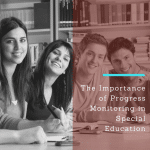Students with disabilities and students with learning difficulties are provided with various accommodations for classroom strategies, resources, and assessments so they are not disadvantaged. It is often difficult for educators to determine the most appropriate accommodation to use and whether or not they are reasonable. An accommodation or adjustment that helps one student may not work for another. The use of an Education Assistant (EA) to help students with classroom work and assessments is an important teaching and management strategy.
Teachers want their students to succeed. After spending five or more weeks teaching specific knowledge and skills to their students and revising this content, teachers need to assess the understanding that has been gained. When administering, an assessment it can be very frustrating for a teacher to see students with disabilities or learning difficulties struggle to show what they know. The level of support or accommodation that a teacher gives can have great impact on the end result a student achieves. Finding the balance between prompting and taking over is difficult. Teachers often walk a fine line when assisting students. Considering the difficulty that teachers experience, professional development for Educational Assistants (EA’s) is essential.
Education Assistants work to build positive relationships with their students and have the opportunity to do so in several subject areas. Many EAs will see particular students several times a week as they work in various classes with the student. Teachers may only see these same students twice a week and are not able to take as much time building a rapport. EAs will usually have a better idea of the capabilities of a student, their behaviors, learning styles, special interests, family, background, triggers, and how often they need to rest. EAs have a great desire to see their students succeed. This is especially true when the EA has worked with the same student for a number of years. Testing situations can place the EA in a compromising and confusing position as they battle between keeping it positive and ensuring the student given the grade they deserve.
Five areas for which professional development must be provided to EA’s:
HOW MUCH HELP IS TOO MUCH?
The answer is always determined based on the EA’s knowledge of the student. Maintaining the delicate balance between just enough help and too much is difficult for everyone and the level of support required will change for each student. Remember: what is reasonable for one student may not be reasonable for another. EA’s need ongoing training in ways to get to know and relate to their students so they can make the best decisions about levels of help needed.
LEGISLATION and POLICY
It is important for EA’s and classroom teachers to be aware of the policies and recommendations set forward by the governing body of education in the state and district. Policy Documents are a good starting point for this and can be accessed, in most cases, online. Ongoing policy training is an important way to stay involved in the newest rules and regulations.
HEAD OF DEPARTMENT
While it is useful for EA’s to be aware of the department policy, it is more important for them to know what the head of department expects. It is easy to become overwhelmed with technical jargon and confusing processes written in policy documents. Therefore, the head of department needs to be clear when outlining expectations for support staff and communicating these expectations to classroom teachers.
CLASSROOM TEACHER
There are times when EA’s are given very little warning (5 minutes or less) that the student they are working with will be completing assessment during the lesson. In this situation it is practically impossible to prepare for the situation and ensure a level of support has been negotiated between the classroom teacher and education assistant. When possible, teachers need to explain the assessment item and criteria to the support staff (more than one Education Assistant may be required over a period of time). Teachers can contribute to the welfare of their students by engaging in continued communication with their EA’s. It would be helpful for teachers to share their own techniques for supporting students during assessment, especially in terms of language, suggested examples and class notes they could access.
EDUCATION ASSISTANT CONTINUED TRAINING
When the EA has been working in the classroom with the student and has extensive background knowledge of the subject matter as well as the student, this needs to be acknowledged. The EA needs to be recognized as a knowledgeable member of the team supporting the student. At the same time, the EA needs to remember the purpose of the assessment and the criteria, ensuring that it is the student’s knowledge and skills that are being used to complete the assessment. Ongoing professional development that engages both teachers and EA’s in working relationships can only benefit their mutual students.
Next week, Part#2 of this series will provide 5 steps for Education Assistants to support students taking assessments. Part #3 will provide tips for teachers about how to best engage their EA’s and make the most of the assistants in their classroom.





Thanks, that was quite a helpful post…